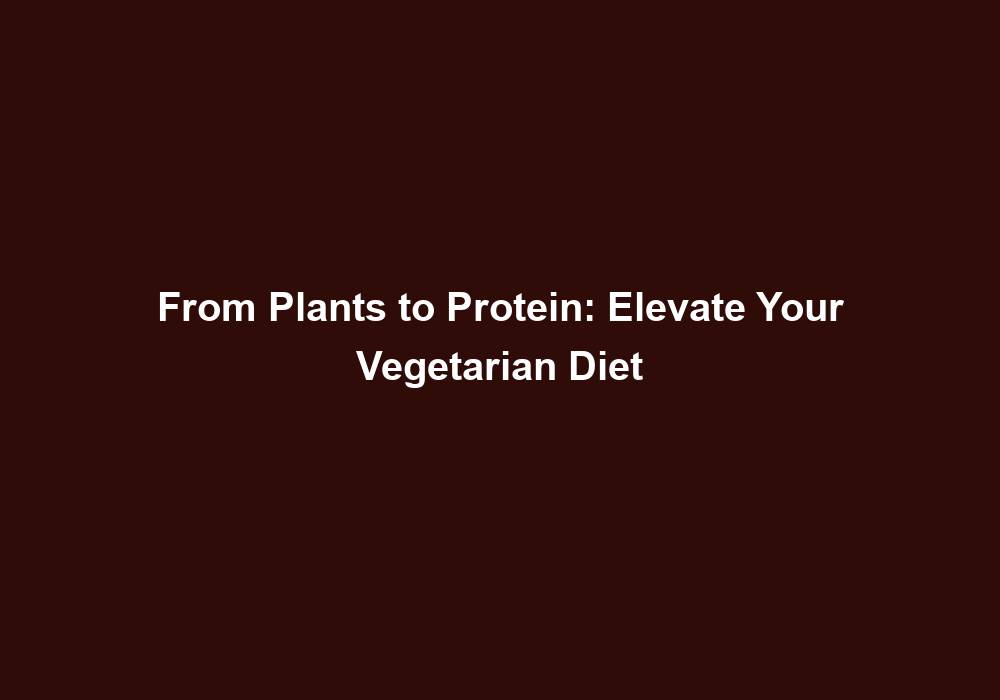From Plants to Protein: Elevate Your Vegetarian Diet
Maintaining a well-balanced vegetarian diet can provide numerous health benefits while also contributing to a sustainable and ethical lifestyle. However, it is important to ensure that your diet includes an adequate amount of protein, as it plays a vital role in various bodily functions. In this article, we will explore how you can elevate your vegetarian diet by incorporating plant-based protein sources that are both delicious and nutritious.
The Importance of Protein in a Vegetarian Diet
Protein is an essential macronutrient that is responsible for building and repairing tissues, supporting immune function, producing enzymes and hormones, and providing energy. While many people associate protein with animal products, it is entirely possible to meet your protein needs through plant-based sources.
Plant-based protein sources offer numerous benefits for vegetarians. They are typically lower in saturated fat and cholesterol, making them heart-healthy options. Additionally, they are rich in dietary fiber, vitamins, and minerals, which contribute to overall well-being. By incorporating a variety of plant-based proteins into your diet, you can ensure that you are meeting your nutritional requirements while enjoying a diverse range of flavors and textures.
Plant-Based Protein Sources
-
Legumes: Lentils, chickpeas, black beans, and kidney beans are excellent sources of protein. They also contain essential minerals, fiber, and complex carbohydrates. Legumes can be easily incorporated into your meals, whether you’re making hearty soups, stews, or salads. Consider combining them with whole grains to create a complete protein source.
-
Quinoa: This ancient grain is a complete protein, meaning it contains all nine essential amino acids that our bodies cannot produce on their own. Quinoa is incredibly versatile and can be used as a base for salads, stir-fries, or even as a substitute for rice. It’s also packed with fiber, iron, magnesium, and other beneficial nutrients.
-
Tofu and Tempeh: Derived from soybeans, tofu and tempeh are highly nutritious and protein-rich options for vegetarians. Tofu has a mild taste and can be marinated, grilled, or added to stir-fries, while tempeh has a nuttier flavor and is great for sandwiches or used as a meat substitute in various recipes. These soy-based products are not only high in protein but also contain essential minerals like calcium and iron.
-
Seitan: Also known as wheat meat, seitan is made from gluten, the protein found in wheat. It has a chewy texture and absorbs flavors exceptionally well. Use seitan in stir-fries, stews, or even as a meat substitute in sandwiches or burgers. It is important to note that seitan is not suitable for individuals with gluten sensitivities or celiac disease.
-
Nuts and Seeds: Almonds, walnuts, chia seeds, hemp seeds, and pumpkin seeds are all excellent sources of protein, healthy fats, and various beneficial nutrients. These plant-based protein sources can be easily incorporated into your diet by sprinkling them over salads, yogurts, or incorporating them into homemade energy bars. They provide not only protein but also essential fatty acids and antioxidants.
-
Plant-based Protein Powders: If you find it challenging to meet your protein requirements solely through whole foods, consider adding plant-based protein powders to your diet. Pea protein, brown rice protein, and hemp protein powders are popular choices that can be easily blended into smoothies or used in baking. These powders offer convenience and a concentrated source of protein, making them an excellent option for individuals with higher protein needs.
Incorporating a variety of plant-based protein sources into your vegetarian diet ensures that you are getting a wide range of essential amino acids, vitamins, and minerals. Experimenting with different recipes and cooking methods can help you discover new flavors and textures, making your meals exciting and enjoyable.
Tips for Maximizing Protein Absorption
To ensure optimal protein absorption and utilization in your body, consider the following tips:
-
Combine Complementary Proteins: While plant-based proteins may not always contain all essential amino acids individually, combining different protein sources can create a complete amino acid profile. For example, combining grains with legumes or nuts with seeds can provide a balanced amino acid intake. This ensures that you are receiving all the necessary building blocks for protein synthesis.
-
Include Vitamin C-Rich Foods: Vitamin C enhances iron absorption, which is crucial for vegetarians who may have a higher risk of iron deficiency. Add citrus fruits, bell peppers, tomatoes, and leafy greens to your meals to increase iron absorption. Pairing vitamin C-rich foods with plant-based iron sources, such as legumes or dark leafy greens, can help optimize iron absorption and prevent deficiencies.
-
Optimize Gut Health: A healthy gut promotes better nutrient absorption. Incorporate probiotic-rich foods like yogurt, sauerkraut, and kimchi into your diet to support a thriving gut microbiome. Probiotics help maintain a healthy balance of bacteria in your gut, which aids in digestion and nutrient absorption. Additionally, consuming dietary fiber from fruits, vegetables, and whole grains supports a healthy gut environment.
-
Consider Protein Timing: Distributing protein intake throughout the day can aid in maximizing muscle protein synthesis. Aim for a consistent protein intake at each meal rather than relying on a single protein-rich meal. This ensures a steady supply of amino acids for muscle repair and growth. Consider incorporating protein-rich snacks, such as nuts or Greek yogurt, between meals to maintain a constant protein supply.
Conclusion
Transitioning to a vegetarian diet doesn’t mean compromising on protein. By incorporating a diverse range of plant-based protein sources into your meals, you can elevate your vegetarian diet and ensure that you meet your daily protein needs. Experiment with various recipes, explore different cooking methods, and enjoy the abundance of flavors and nutrients that plant-based proteins have to offer. Embrace the journey of nourishing your body while also making a positive impact on the environment and animal welfare.
Disclaimer: This article is for informational purposes only and should not replace professional medical advice. Consult a healthcare professional before making any significant changes to your diet.







